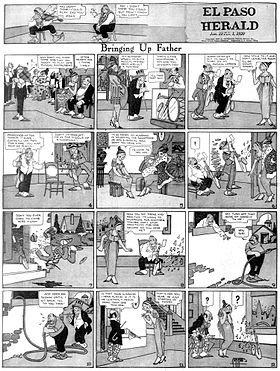Maggie and Jiggs
| Bringing Up Father | |
|---|---|

Bringing Up Father (January 31, 1920)
|
|
| Author(s) | George McManus |
| Current status / schedule | Defunct |
| Launch date | 1913 |
| End date | 2000 |
| Alternate name(s) | Jiggs & Maggie |
| Syndicate(s) | King Features Syndicate |
| Genre(s) | Humor |
Bringing Up Father was an American comic strip created by cartoonist George McManus. Distributed by King Features Syndicate, it ran for 87 years, from January 12, 1913, to May 28, 2000.
Many readers, however, simply called the strip "Jiggs and Maggie" (or "Maggie and Jiggs"), after its two main characters. According to McManus, he introduced these same characters in other strips as early as November 1911.
The humor centers on an immigrant Irishman named Jiggs, a former hod carrier who came into wealth in the United States by winning a million dollars in a sweepstakes. Now nouveau-riche, he still longs to revert to his former working class habits and lifestyle. His constant attempts to sneak out with his old gang of boisterous, rough-edged pals, eat corned beef and cabbage (known regionally as "Jiggs dinner") and hang out at the local tavern were often thwarted by his formidable, social-climbing (and rolling-pin wielding) of a wife, Maggie, their lovely young daughter, Nora, and infrequently their lazy son, Ethelbert, later known as just Sonny.
The strip deals with "lace-curtain Irish", with Maggie as the middle-class Irish American desiring assimilation into mainstream society in counterpoint to an older, more raffish "shanty Irish" sensibility represented by Jiggs. Her lofty goal—frustrated in nearly every strip—is to bring father (the lowbrow Jiggs) "up" to upper class standards, hence the title, Bringing Up Father. The occasional malapropisms and left-footed social blunders of these upward mobiles were gleefully lampooned in vaudeville, popular song, and formed the basis for Bringing Up Father. The strip presented multiple perceptions of Irish Catholic ethnics during the early 20th century. Through the character Jiggs, McManus gave voice to their anxieties and aspirations. Varied interpretations of McManus's work often highlight difficult issues of ethnicity and class, such as the conflicts over assimilation and social mobility that second- and third-generation immigrants confronted. McManus took a middle position, which aided ethnic readers in becoming accepted in American society without losing their identity. A cross-country tour that the characters took in September 1939 into 1940 gave the strip a big promotional boost and raised its profile in the cities they visited.
...
Wikipedia
